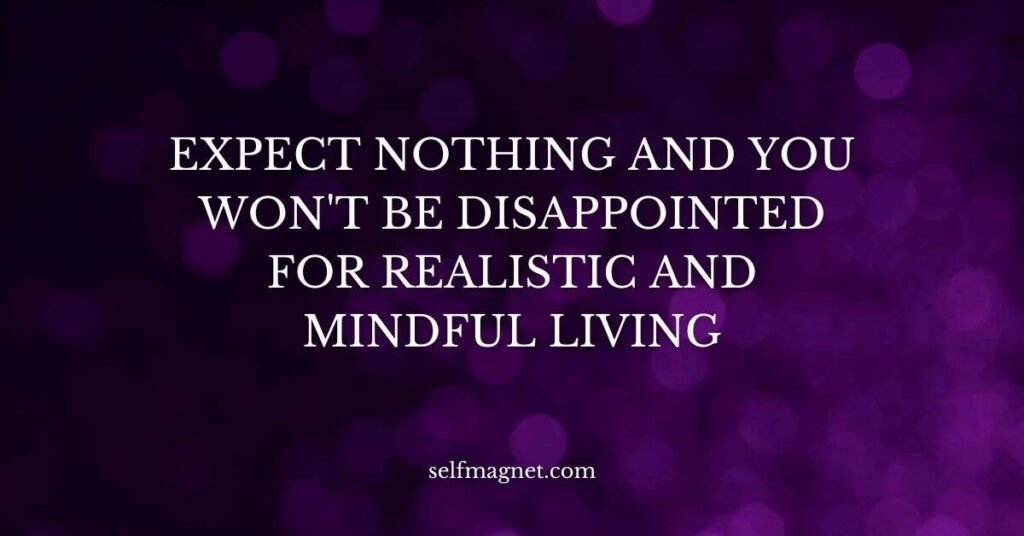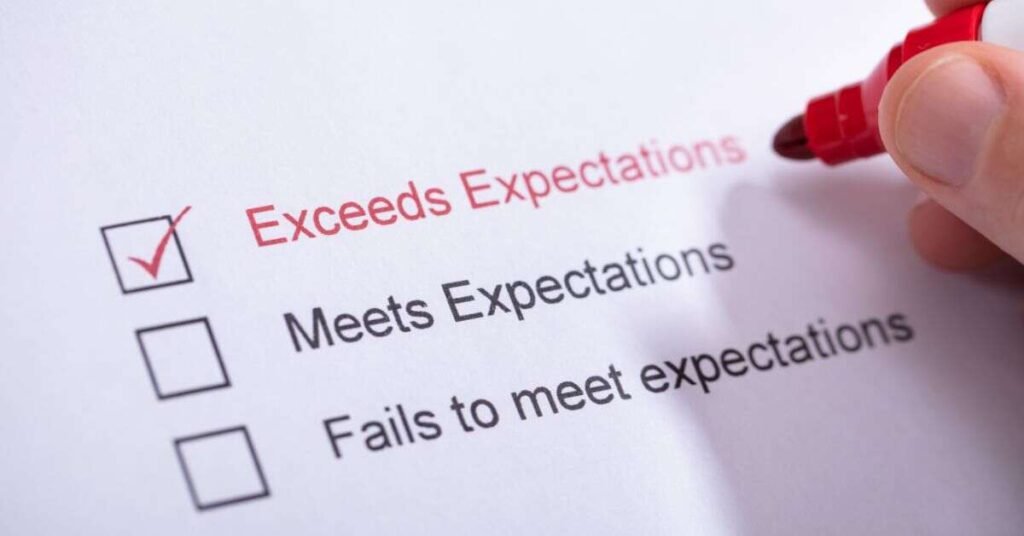In a world where high hopes and aspirations often lead to unmet desires, expect nothing, and you won’t be disappointed offers a refreshing perspective.
This seemingly illogical approach isn’t about pessimism or giving up on dreams but rather about realistic and mindful living.
Join us as we explore the psychology behind expectations, uncover the hidden benefits of this philosophy, and learn practical ways to cultivate a more balanced outlook on life.
Let’s have a closer look at the concept of expectations first.
Why Do People Have Expectations?
Expectations are inherent in human behavior.
They guide our actions, shape our experiences, and influence our relationships.
People hold expectations for various reasons.
- Predictability: Expectations bring predictability and control to the future. They help people steer life with purpose.
- Motivation: Expectations drive individuals to achieve better outcomes. High expectations fuel growth.
- Social Influence: Society, culture, and family impose expectations on individuals. These outside factors influence how we think and act.
But when expectations are too high or unrealistic, things can go wrong.
Demanding perfection in every task leads to disappointment and stress.
Now, we’ll cover the concept of expecting nothing.
The Concept of Expecting Nothing
Understanding the nuances of expecting nothing is important for implementing this philosophy effectively in your life.
Origin
The phrase “expect nothing and you won’t be disappointed” has roots in various wisdom traditions, including Stoicism and Buddhism.
At its core, this philosophy encourages us to release our attachment to specific outcomes and instead embrace life as it unfolds.
What Does “Expect Nothing and You Won’t Be Disappointed” Mean?

Expectations are like guesses about how things will go, and they can really mess with our feelings and headspace.
The phrase “expect nothing and you won’t be disappointed” suggests that by lowering or eliminating expectations, you can avoid the emotional distress that arises from unfulfilled hopes.
It involves cultivating an outlook of openness and acceptance while still having goals.
Expecting nothing eases pressure and promotes contentment.
Common Misinterpretations
It’s important to address some common misconceptions:
- It’s not about pessimism: Expecting nothing doesn’t mean always assuming the worst. It’s about fairness and clarity.
- It doesn’t promote apathy: This mindset fosters active participation in life without being fixated on specific results.
- It’s not giving up on goals: You can still pursue goals without tying your happiness to them.
Expecting nothing doesn’t eliminate hope; it safeguards inner peace.
Psychological Perspectives
From a psychological perspective, expectations are natural and often formed based on past experiences, societal norms, and personal desires.
We’re constantly exposed to messages about success, relationships, and achievements from a young age.
These messages define how we measure reality.
The problem occurs when expectations are rigid and impractical.
Holding ourselves to impossible standards causes disappointment, frustration, and a sense of failure.
Factors Affecting Personal Expectations are mentioned below:
| Factor | Description |
| Personal Experiences | Our life experiences shape our expectations. Growing up in a loving environment makes us expect the same from relationships, while negative experiences can make us more cynical and lower our expectations. |
| Societal Norms | Cultural values and societal expectations influence our views on success and happiness. Some societies prefer materialism often leads to unrealistic expectations about wealth and possessions. |
| Media Influences | Social media and advertising bombard with idealized images of life. Celebrities living lavishly and influencers with perfect relationships can create unattainable expectations for one’s own life. |
Letting go of expectations brings joy in unexpected places.
Thinking differently helps us be more receptive to change.
Self-confidence is believing the right stories.
Cognitive framing affects our perception of outcomes and our emotional responses.
Our brains notice evidence that confirms our expectations.
What we already believe can change how we see things by causing us to ignore contradictory information.
Studies indicate that individuals with high but realistic expectations experience better mental health outcomes.
According to psychologist Albert Ellis, irrational beliefs and unrealistic expectations can lead to emotional distress.
The Cycle of Unrealistic Expectations and Disappointment
The cycle of unrealistic expectations can harm our emotional health and overall happiness.
This is how it usually happens:
- Aiming for excellence: Individuals strive for lofty goals motivated by societal pressures, personal desires, or comparisons.
- Reality Fails to Meet Aspirations: Despite efforts, the outcome often falls short. This gap between expectation and reality is the root of regret.
- Emotional Response: Failure to meet goals results in negative emotions: sadness, frustration, and disappointment.
- Reinforcement of Negative Beliefs: Repeated failures strengthen negative self-beliefs and result in a cycle of low self-esteem and diminished motivation.
- Cycle Repeats: Unless projections are adjusted, unreachable milestones will continue to be set, perpetuating the cycle of despair.
Examples:
- Career: Hoping for a quick promotion in a new role can be frustrating if it doesn’t happen.
- Relationships: Expecting a partner to meet emotional needs without talking can cause tension and disappointment.
- Personal Achievements: Trying to lose a lot of weight quickly often leads to frustration and discouragement.
Breaking the Cycle

It involves several key steps:
- Awareness: Recognize when expectations are far-fetched. Knowing this is the first big step to making changes.
- Adjustment: Adjust expectations to be more feasible. Break down large goals into smaller, manageable steps.
- Acceptance: Accept that bumps in the road are normal when you’re working on something. Try to see tough times as chances to learn, not just bad luck.
- Positive Reinforcement: Praising yourself for small wins helps you stay strong and keeps you going.
- Practice Self-Compassion: Be kind to yourself when things don’t go as planned.
- Seek Feedback: Regular feedback from peers, mentors, or loved ones can provide a reality check and help in setting realistic expectations.
- Reflect and Reevaluate: Periodically reflect on your goals and expectations. Reevaluate them based on current circumstances and adjust as necessary.
People also read:
How I Will Develop Myself in a Positive Manner: Top Tips
Why do I Feel Like a Burden: Lightening the Load
The Science Behind Expectations and Mental Health

Research indicates that expectations play a crucial role in how we perceive and react to life events.
For instance, a study found that people with high expectations are more likely to experience greater levels of anxiety and depression compared to those with moderate expectations.
The study concluded that managing expectations is crucial for upholding mental wellness and preventing emotional distress.
Chronic high expectations can contribute to the following:
- Increased stress levels
- Persistent feelings of dissatisfaction
- Strained relationships
- Decreased self-esteem
- Burnout and mental fatigue
- Lowered motivation
- Heightened anxiety
- Frequent frustration
- Reduced overall well-being
- A constant sense of inadequacy
Practical Strategies to Manage Expectations
Managing expectations is key to handling life’s ups and downs. It involves consciously refining our anticipations to suit the situation better.
Expectation management technique encourages:
- Be aware of expectations to ensure goals match capabilities and circumstances. This involves a thorough self-assessment of your skills, resources, and limitations. Consider external factors that might impact your ability to meet expectations, such as market conditions or team dynamics.
- Identify when ambitions are unachievable. Learn to identify red flags that signal overly ambitious goals, such as tight deadlines or resource constraints. Develop the ability to evaluate expectations set by yourself or others critically, and don’t hesitate to question them when necessary.
- Be transparent and engage in active listening to foster understanding. Open communication is key to managing expectations effectively. Share your thoughts, concerns, and progress regularly with others. Practice empathetic listening to grasp others’ perspectives and needs truly.
- Divide big goals into smaller, attainable tasks. Create a detailed action plan with milestones and deadlines for each subtask. This method provides a clear roadmap and allows for regular performance monitoring.
- Adjust expectations as needed. Remain flexible and regularly review targets to adapt as needed. Embrace change as a natural part of any process. Schedule periodic evaluations of your progress and be willing to modify your scheme or timelines when circumstances shift.
- Pay attention to what’s happening now instead of always worrying about later. Cultivate mindfulness to focus on current tasks without being overwhelmed by the ultimate purpose.
- Address issues proactively and develop strategies to handle setbacks. Anticipate potential obstacles and create contingency plans. When problems arise, face them head-on rather than avoiding them.
- Celebrate small wins for motivation and satisfaction. Acknowledge progress at every stage, no matter how minor it may seem. This practice boosts morale and maintains momentum.
- It’s about finding a balance between hope and realism, ambition and acceptance. Strive for goals that challenge you while remaining achievable. Cultivate a growth mindset that allows for both optimism and pragmatism.
- Meditation and deep breathing aid in staying present and reducing anxiety. Incorporate these practices into your daily routine to manage stress and maintain focus. Even brief sessions can greatly enhance your mental clarity and emotional stability, helping you manage expectations more effectively.
Conclusion
Expect nothing, and you won’t be disappointed isn’t about relinquishing ambition or avoiding goals but about harmonizing idealism and practical concerns.
Throughout this exploration, we’ve uncovered the psychology behind expectations, the cycle of disappointment that unrealistic expectations can create, and the potential impact on our mental health.
By staying present, setting better goals, spotting unfeasible hopes, practicing self-compassion, and cheering for small wins, a happier, more balanced life can be built.
This outlook helps us deal with life better and enjoy it more without always worrying about unmet hopes.
Life’s most memorable moments often surprise us when we least expect them.